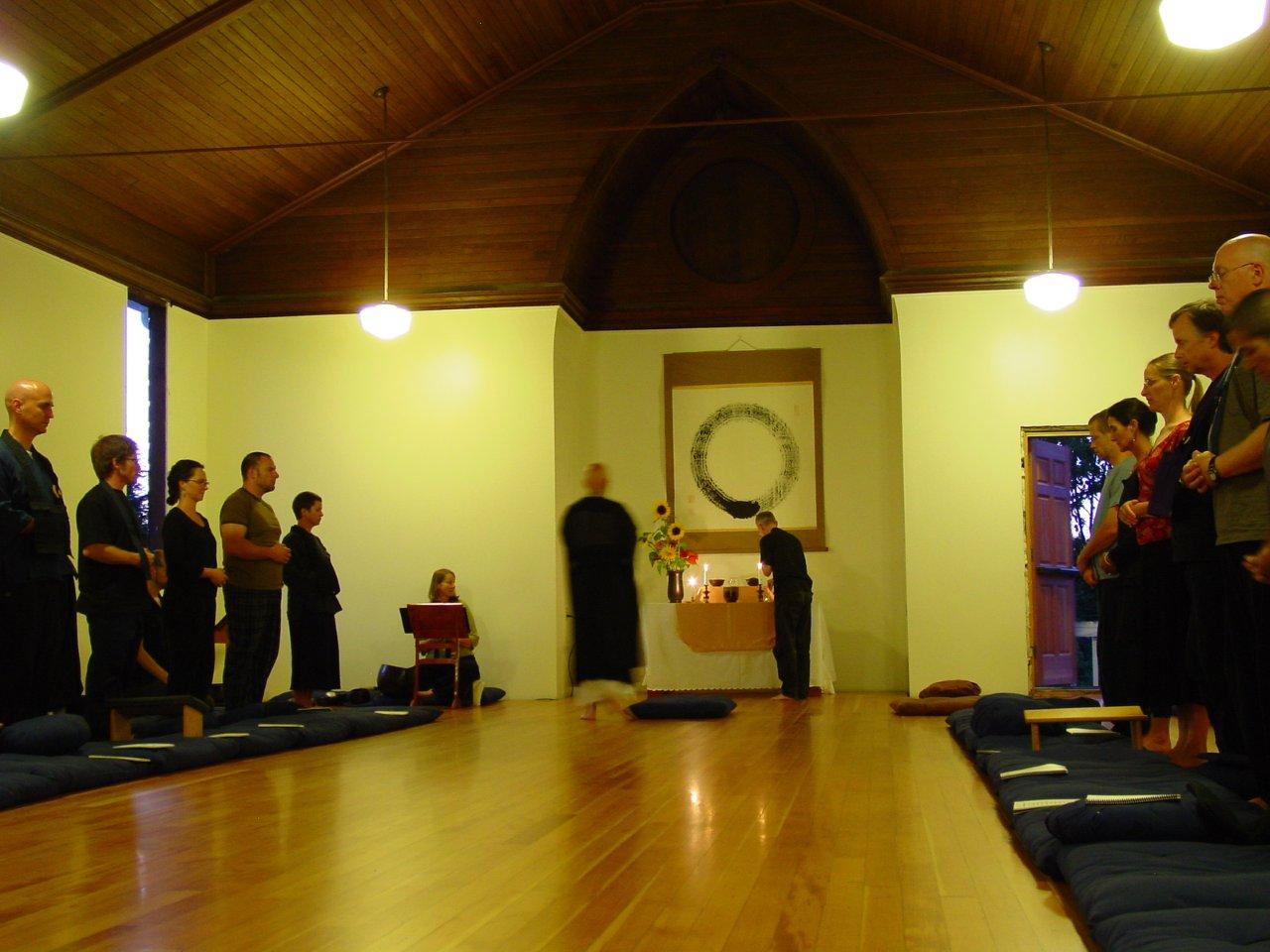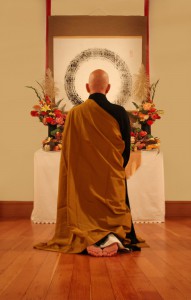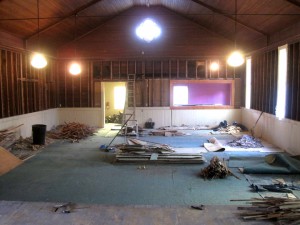New Heart of Wisdom Temple Offers Link To Deep Zen Practice in Urban Portland
Written by: Kari Kishin Lindahl

Sangha members gather in the newly renovated Heart of Wisdom Temple.
Photos by: Julie Grant Weiss
Last summer, the Zen Community of Oregon (ZCO) officially celebrated the opening of Heart of Wisdom Zen Temple in northeast Portland’s Woodlawn neighborhood. A year later, the temple is alive with the dynamic balance of urban American Zen practice – the lively bustle of events and ongoing site improvements grounded by the stillness of zazen, or silent meditation practice.
“A new building is only the outer expression of the heart within,” said Zen Teacher Hogen Bays, who is the spiritual co-director of ZCO and co-abbot of Great Vow Zen Monastery along with his wife Jan Chozen Bays, roshi. “Right now our community is filled people who have a vital and lively spiritual practice.”
It is precisely the committed practice of ZCO members that brought Heart of Wisdom into reality. By 2006, it was clear that ZCO was outgrowing the space rented from Dharma Rain Zen Center for more than 15 years. Experiencing the transformative power of vows (or making fundamental commitments), which Chozen and Hogen emphasize with their students, ZCO vowed to create a hearth, a bridge, and an offering. That vow is now Heart of Wisdom Zen Temple.
The hearth is the warm welcome of the urban practice center, a container that honors and supports the 10,000 facets of householder life. The Buddha taught the importance of a four-fold community of lay women, lay men, ordained women and ordained men. Householders are the lay men and women, and the temple is the stable source of practice for their urban lives.

Hogen Bays, co-abbot of the Zen Community of Oregon, leading the dedication of the Heart of Wisdom temple.
A bridge represents the mutual pathway from the urban community at Heart of Wisdom to the deep well of practice at Great Vow Zen Monastery, which follows a traditional monastic schedule and holds monthly sesshins (or silent meditation retreats).
The offering is the reaching out to the larger Portland community, actualizing ZCO’s central vow for members to become awakened through and for the service of others.
In service of this mission, Heart of Wisdom offers both a consistent schedule of meditation and a diverse array of workshops and community events. Four nights a week, silent zazen is offered. Three of those nights are accompanied by either a dharma talk or personal interviews. Beginning meditation instruction is offered most nights and is always free of charge. (No registration is required, visitors may just check in with one of the greeters at the door.)
At the full moon each month, the community gathers for metta, or loving kindness meditation, joining Buddhist communities around the world in this practice. One Saturday a month a morning of zazen is offered, and once a season Heart of Wisdom holds zazenkai, or a day of silent meditation. Structured to mirror the silent retreat schedule at Great Vow, zazenkai offers urban practitioners an opportunity to step more deeply into silence together.
Zen Community of Oregon plans to continue to expand the meditation schedule over the next few years into offering daily morning and evening sitting.
Community workshops and events often tie into the thread of practice at Great Vow. For example, senior lay students lead “Mindful Eating Meet-Ups” each month, to support those practicing with their eating habits, following Chozen’s teachings on the topic. This summer, teachings will be given on the intersection of sustainability and Zen practice, on working with the inner critic, and on starting or refining a meditation practice.

Heart of Wisdom, Portland, before renovation.
The community also sponsors refugees from Burma and Thailand, works with local schools to provide children with food, and is participating with the Woodlawn Neighborhood Association to become an active part of the neighborhood.
The dynamic life at Heart of Wisdom is the result of individual practitioners taking up the community’s vow to create a hearth, a bridge, and an offering. For example, what is a hearth if it’s not welcoming? Before the building itself was even a reality, one senior lay student used research from the Alban Institute, a Herndon, Va.-based organization supporting primarily Christian congregations, to help the CZO community examine existing norms, understand the upcoming transition, and focus on welcoming new people. From this, another senior lay student trained a team of greeters to ensure the community’s norms reflected a welcoming atmosphere.
The commitment of volunteers has also been pivotal in all aspects of owning a new building. Many, many generous financial contributors made the purchase of the building possible.
Since the purchase in December 2010, a dedicated volunteer work crew did a massive remodeling of the building. Zen Community of Oregon members stepped forward to maintain the garden, structure the programming, teach meditation, lead the chanting service, ensure the temple is clean, and provide cookies and tea.
“Heart of Wisdom Zen Temple came together with hard work, years of practice, our mutually held intentions and strong faith, along with deep, deep inspiration from our teachers and the teachings of the Buddha dharma,” reflected Temple Manager Nancy Kodo Conover, who led the remodeling crew through six months of work before the temple opened.
What inspires the commitment of so many people? Chozen and Hogen’s focus on vows starts with a commitment to ethical living. This foundational commitment creates a container where it’s safe to engage deep spiritual work.
The practice of zazen, particularly with community and under the guidance of ethical teachers, cultivates a clear mind and open heart. It supports connection between community members, which leads to a sense of belonging and a desire to contribute back. The focus on vows aligns those contributions with the Buddha’s teachings, allowing practitioners to find the unique gift they have to offer the community.
“Lay life is not the same as living in a monastery. It doesn’t have the support of a community living and practicing together moment-by-moment. So, how do we enliven the fire of sincere lay practitioners?” said Ryushin Creedon, who is the senior ordained person in charge of the forms and practice at the temple. “The way is through undertaking strong ethical intentions, making the most of our opportunities to practice with community, stepping into the deep stillness of sesshin when we are able, and being of service to everyone we meet.”
